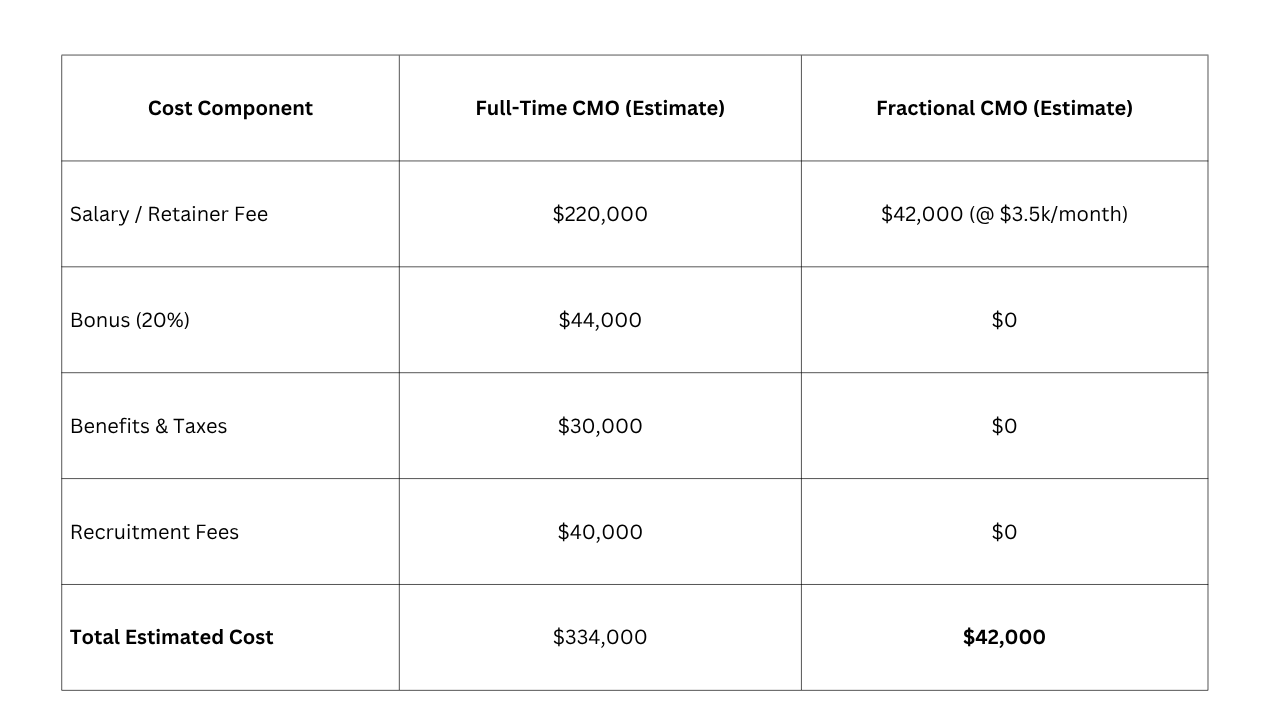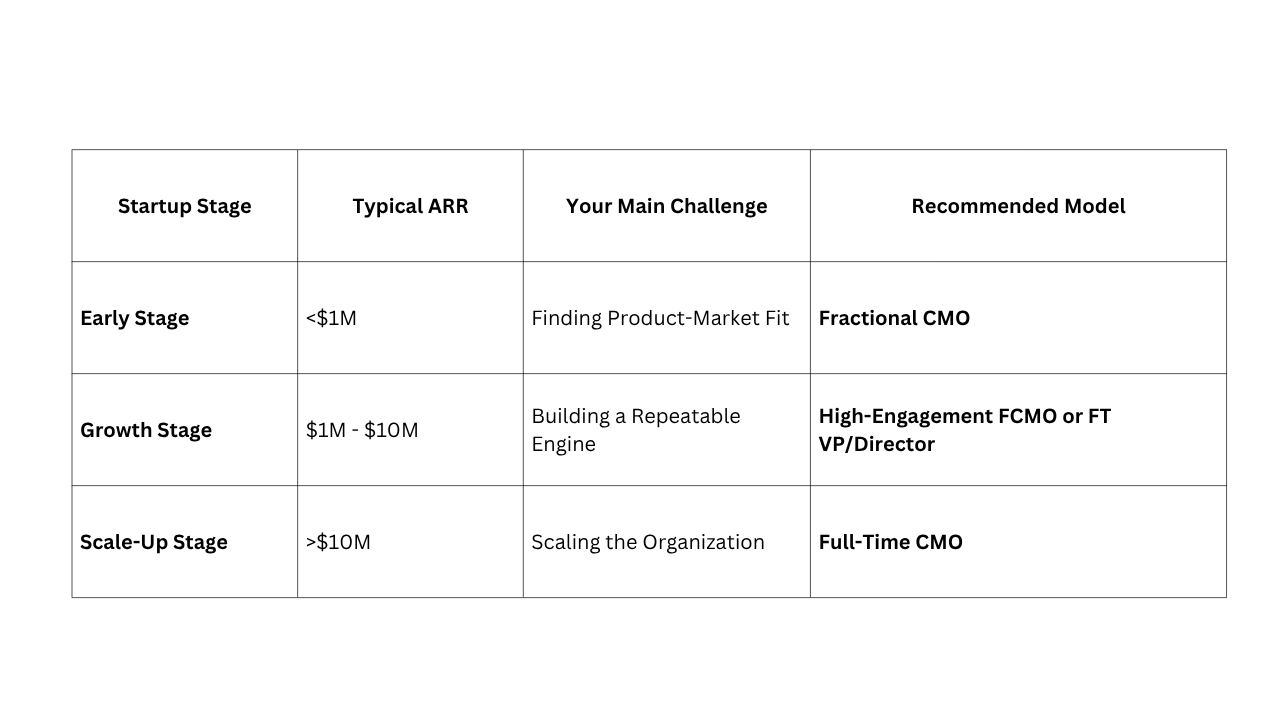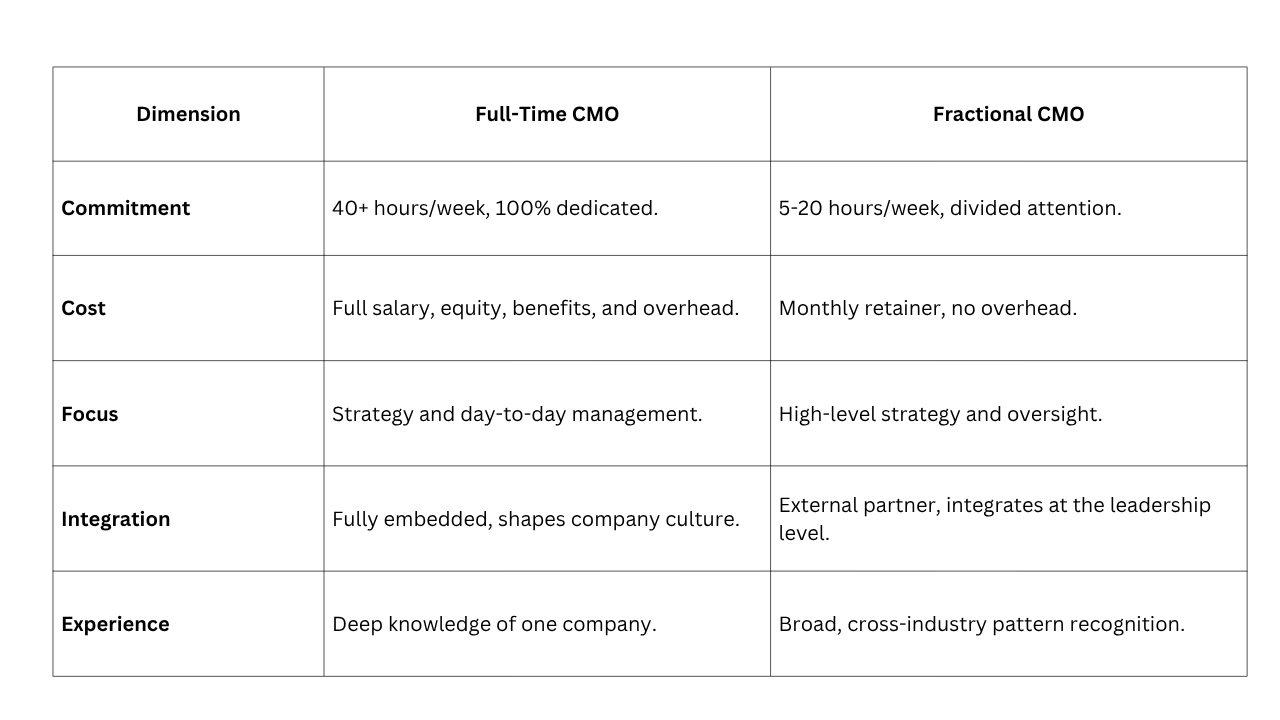Fractional vs. Full-Time CMO: Which is Right for Your SaaS Startup?
SAASGROWTH
10/7/20255 min read


For a SaaS startup, growth isn't just a goal. It's oxygen.
In a world of recurring revenue and fierce competition, your marketing leader is the engine that drives valuation, market share, and survival. Choosing them is one of the biggest decisions you'll ever make.
But this is where most founders get stuck.
You need elite, C-level strategy from day one. Yet, the crippling cost of a full-time Chief Marketing Officer (CMO) can drain your runway before you even take off.
This tension has created a powerful solution: the fractional CMO. No longer a niche compromise, it’s now a strategic weapon for savvy startups.
Let's break down which model is right for you, right now.
The Full-Time SaaS CMO: Architect of the Scaling Machine
Forget old-school brand management. Today's SaaS CMO is a growth strategist and a revenue architect.
They are a data-driven executive who is relentlessly accountable for Annual Recurring Revenue (ARR). As a key partner to the CEO, they turn business goals into a scalable, predictable growth engine.
What a Full-Time CMO Owns:
Strategic Leadership: They develop and execute the long-term GTM strategy, keeping a close eye on the competition and market trends.
Revenue Accountability: They own the pipeline. Period. This means driving demand, acquiring customers, and working with sales to create a seamless funnel.
Team & System Building: They build a high-performing marketing team from the ground up, hiring talent and implementing the right martech stack.
Cross-Functional Glue: They are the link between marketing, sales, product, and customer success, ensuring everyone is aligned.
A full-time CMO becomes non-negotiable when you're ready to hit the accelerator, usually post-Series B. But hiring one too early is a famously costly mistake, leading to financial burn and mismatched expectations.
The Fractional CMO: On-Demand Strategic Horsepower
The fractional CMO model is a smart answer to the cost and risk of a full-time executive.
Think of it as "CMO-as-a-Service." You get a seasoned, executive-level marketer who joins your team part-time, taking full ownership of the marketing function.
The real value here is "talent arbitrage." You get access to A-list talent with battle-tested playbooks—something you otherwise couldn't afford. You're buying their strategic brain, not their 40-hour work week.
What a Fractional CMO Delivers:
A Solid GTM Foundation: They build the strategic pillars—defining your ideal customer profile (ICP), crafting your market position, and developing the initial GTM playbook.
Systems and Processes: They don't just run campaigns; they build a durable marketing machine with standardized workflows and automation.
Data-Driven Operations: They establish the KPIs that actually matter, creating dashboards that give you actionable, revenue-linked insights.
This isn't a fringe movement. The "fractional executive" model is booming. According to LinkedIn data, C-suite profiles with "fractional" in the title surged an incredible 5,400% recently. It's a fundamental shift in how startups access leadership.


Head-to-Head: A Quick Comparison
So, how do they really stack up? Here’s a simple breakdown.
The key takeaway is the "Execution Gap." A fractional CMO is a strategist, not a one-person team. Their success depends on having people to execute the plan.
→ Explore our marketing services to see how we can bridge that gap.
The Financial Calculus: Let's Talk Numbers
For a startup, every dollar counts. A full-time CMO's salary is just the start.
With bonuses, benefits, and recruitment fees, the total cost is often double the base salary. We call this the "2x Rule of Thumb." A CMO with a $250,000 base salary can easily cost you over $450,000 in the first year.
The fractional model is much simpler, with retainers typically between $5,000 to $20,000 per month.
Here's how that looks annually:


A fractional CMO can give you senior-level leadership for 50-80% less. That's strategic capital you can pour back into your product.
The Startup Lifecycle Matrix: Your Stage-Specific Playbook
The right choice depends entirely on your stage of growth.


Early Stage (<$1M ARR): You need high-level strategy and flexibility without the massive burn. A fractional CMO is perfect.
Growth Stage ($1M-$10M ARR): You need to scale what works. This is the time for a high-engagement FCMO or your first full-time marketing leader—often a hands-on VP or Director, not a C-level strategist.
Scale-Up Stage (>$10M ARR): Complexity explodes. You need a dedicated, full-time CMO to manage large teams and budgets.
The Transition Playbook: From Fractional to Full-Time
A fractional engagement is often the perfect bridge to a full-time leader. The key is managing the transition.
It's time to hire a full-time CMO when:
Your team is growing. Once you hit 5-10 marketers, you need a dedicated manager.
Your operations are scaling. Big budgets and complex campaigns become a full-time job.
Your growth is predictable. The engine is built; now it's time to pour fuel on the fire.
Think of this as the ultimate "try before you buy." Your fractional CMO can help you define the full-time role, recruit candidates, and ensure a seamless handover.
The Real Answer? It's About Founder Clarity
The best choice isn't about which model is "better." It's about which is right for you, right now.
But the success of any marketing leader hinges on one thing: your clarity as a founder.
Without a clear role, precise goals, and the genuine empowerment to lead, even the best executive will fail.
So, before you ask, "Who should I hire?" first ask yourself:
"Am I prepared to lead them to success?"
Ready to explore how the right marketing leadership can transform your startup? Let's talk.
FAQ’s
1. When should a seed-stage SaaS startup hire a fractional CMO?
When you need to build a scalable marketing strategy beyond founder-led sales.
2. What’s the main ROI difference between a fractional and full-time CMO?
A fractional CMO provides a much faster path to positive ROI due to the significantly lower initial investment.
3. How does a fractional CMO integrate with an existing team?
They act as a true leadership partner, setting strategy and mentoring the team to execute it.
4. What results can be expected in the first 90 days with a fractional CMO?
A full marketing audit, a clear GTM strategy, and established KPIs to track progress.
5. Can a fractional CMO help with fundraising?
Yes. They add immense credibility by building a sound marketing plan and compelling growth narrative for your pitch deck.


